Transforming Relationships: Hope for Gender Justice
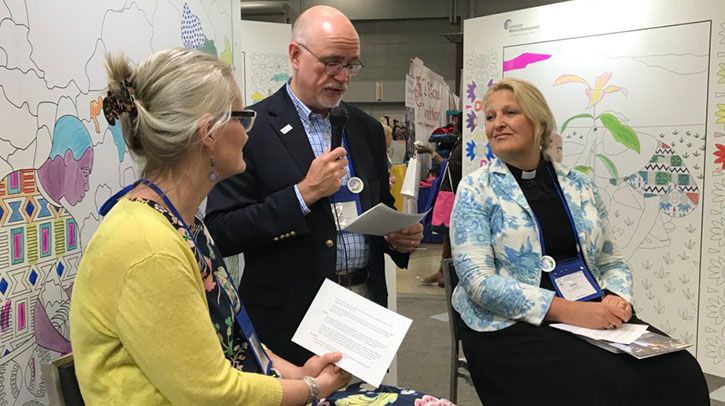
The Rev. Rachel Carnegie reflects on a General Convention conversation and shares her hopes for women and girls around the world.
‘Potential’ and ‘hope’ were the two words that occurred to me as I listened to Kirsten Laursen Muth, Special Advisor, International Programs at Episcopal Relief & Development, explain about a remarkable initiative to end violence against women and girls in Liberia.
Kirsten and I were holding a public conversation at the Episcopal Relief & Development booth at the 79th General Convention in Austin. Surrounded by the vibrant images of community-led initiatives around the world, colored in by visitors to the booth, this felt like a place of hope and possibility.
Kirsten explained how the Liberian initiative engaged faith leaders in tackling violence against women and girls. For them, Liberia is one of the most dangerous places on earth. In a dynamic process, the faith leaders, Christian and Muslim, go through an Experiential Learning Model, to re-evaluate their beliefs about gender and power and identify the solutions in their own hands.
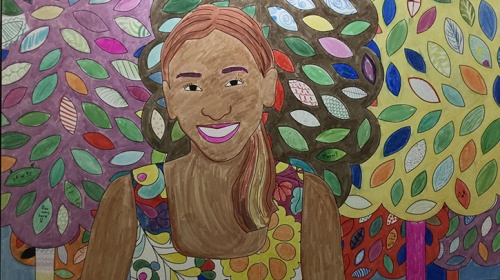
While it is crucial to involve men in this journey towards gender justice, Kirsten reflected that it is also key to help women and girls strengthen their sense of agency and empowerment.
She said that it was important to give the group space to debate scriptural passages from the Bible and the Qu’ran, to reflect on their values and principles. This led to deep commitments on promoting mutual dignity, respect and honor between men and women, boys and girls.
The initiative also builds on the creativity and commitment of youth. They serve as advocates in their communities, using drama, radio and other creative media.
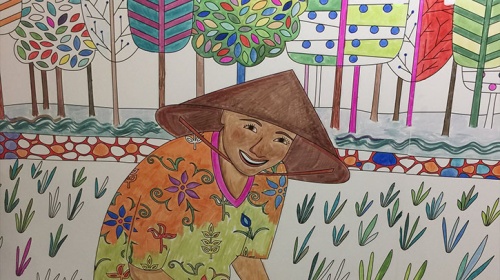
As we spoke it was clear that Kirsten, like her colleagues, is committed to testing and rigorously evaluating models which will truly make a lasting impact. And the research speaks for itself: in the communities involved, incidence of physical and sexual violence against women and girls has dropped from 24.2% to 4%. This is an outstanding achievement.
For me the sense of hope and potential was of course for the women and girls, and indeed men and boys, in these communities in Liberia – that they will be able to live flourishing, dignified lives together. But my excitement also reflected the opportunity for this approach to be adapted to other contexts, with the potential for similar transformation in gender relationships.
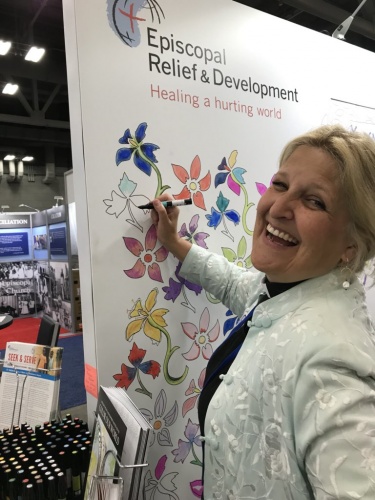
As the Anglican Alliance, the global family of churches and agencies working to end poverty and injustice, we stand ready to travel alongside Kirsten and the team in Liberia and other countries, to share this good news story.
Like the jointly colored images at the booth in Austin, we can each color in our own areas, creating together, learning together, growing together. All over the world the journey to gender justice remains a long and complex one, woven into the beliefs and contexts in each place.
Churches and other faiths, working within their own communities, can become fellow travellers and even catalysts on that journey. We must walk together, learning, inspiring and encouraging one another. You can read more about other initiatives in the Side-by-Side Faith Movement for Gender Justice, of which Episcopal Relief & Development is a member.
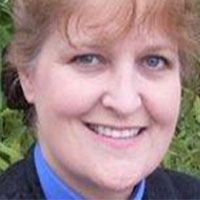
The Rev. Rachel Carnegie is the Co-Executive Director, Anglican Alliance for Development, Relief and Advocacy
Images: (Top) President Rob Radtke, Kirsten Laursen Muth and The Rev. Rachel Carnegie discuss gender-based violence at the 79th General Convention; (Middle) illustrations: A woman colored in by booth visitors; (Last) The Rev. Rachel Carnegie colors in a section of the booth at the 79th General Convention.
Consider making a contribution to the Women’s Empowerment Fund


